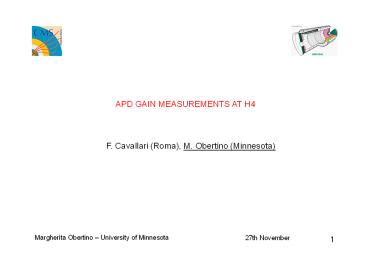Mo`module analysis PowerPoint PPT Presentation
Title: Mo`module analysis
1
APD GAIN MEASUREMENTS AT H4
F. Cavallari (Roma), M. Obertino (Minnesota)
2
Summary
- Method
- Data available
- Preliminary results
3
APD GAIN measured by Hamamatsu
a50
G50
- HV at H4 is not exactly
- V50 for every APD.
- To estimate G at H4 for M0
- we can use
- Hamamatsu measurements
- M0 data
V50
4
GAPD from M0 datamethod(I)
- APD gain cannot be directly measured at H4 ( is
difficult - to measure the signal for very low bias voltage )
- BUT
- we can
- determine a (see CMS IN 2001/33)
- find a relation between a and the APD gain
- use this relation to calculate the APD gain
5
GAPD from M0 datamethod(II)
- At H4 a can be determined perfoming an mini HV
scan - around the working point (Vn)
at the voltage VN
where
G APD gain
6
GAPD from M0 data method(III)
This analysis is based on ROOT preprocessed data
Pulse shape fit meth. 1
Ratio Laser/PIN fitted with a Gaussian
7
GAPD from M0 data Method (III)
To reconstruct laser signal we use pulse shape
fit method 1
M0,1,2
M4
M3
8
HV SCANS
- 2 HV SCANS
- 1 NOV ( 20OC )
- 7 NOV ( 18OC )
- CH3 ( Vn355V )
- 5 HV Steps
- 350
- 352.5
- 355
- 357.5
- 360
- CH2 (Vn360 V)
- 5 HV Steps
- 355
- 357.5
- 360
- 362.5
- 365
CH3
CH2
9
am vs Gain_Hamamatsu
18o
20o
10
(aM a50 )vs Gain_Hamamatsu
In order to be indipendent from APD type we fit
the distribution
(aM a50 )
(aM a50 )AB Gain_Ham
Ham.
From this formula we can calculate the G_tb for
each APD
Test beam
11
Difference between G_Ham and G_tb
Precision of our G measurement 1.5
12
Relative light yield
Milans group has shown the distribution of
without any correction and corrected for the APD
gain (G_Ham)
13
LYs distributions corrected for the APD gain
Correction with G_tb
14
Conclusion future
- Conclusion the method allows to estimate the APD
gain is situ - Next step analyse the SCAN at 20o to understand
the gain variation with the temperature
PowerShow.com is a leading presentation sharing website. It has millions of presentations already uploaded and available with 1,000s more being uploaded by its users every day. Whatever your area of interest, here you’ll be able to find and view presentations you’ll love and possibly download. And, best of all, it is completely free and easy to use.
You might even have a presentation you’d like to share with others. If so, just upload it to PowerShow.com. We’ll convert it to an HTML5 slideshow that includes all the media types you’ve already added: audio, video, music, pictures, animations and transition effects. Then you can share it with your target audience as well as PowerShow.com’s millions of monthly visitors. And, again, it’s all free.
About the Developers
PowerShow.com is brought to you by CrystalGraphics, the award-winning developer and market-leading publisher of rich-media enhancement products for presentations. Our product offerings include millions of PowerPoint templates, diagrams, animated 3D characters and more.

